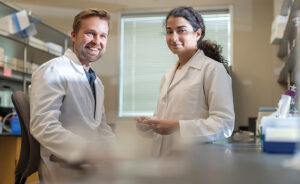
Scientists have revived light-sensing neuron cells in organ donor eyes and restored communication between them as part of a series of discoveries that stand to transform brain and vision research.
Billions of neurons in the central nervous system transmit sensory information as electrical signals; in the eye, specialized neurons known as photoreceptors sense light.
“We were able to wake up photoreceptor cells in the human macula, which is the part of the retina responsible for our central vision and our ability to see fine detail and color,” explains John A. Moran Eye Center scientist Fatima Abbas, a postdoctoral fellow in the lab of Frans Vinberg and lead author of a study detailing the research. “In eyes obtained up to five hours after an organ donor’s death, these cells responded to bright light, colored lights, and even very dim flashes of light.”
While initial experiments revived the photoreceptors, the cells appeared to have lost their ability to communicate with other cells in the retina. The team identified oxygen deprivation as the critical factor leading to this loss of communication.
To overcome the challenge, researchers procured donor eyes in under 20 minutes from the time of death and designed a special transportation unit to restore oxygenation. Vinberg also built a device to stimulate the retina and measure the electrical activity of its cells.
With this approach, the Vinberg Lab was able to restore a specific electrical signal seen in living eyes, the “b wave.” It is the first b wave recording made from the central retina of postmortem human eyes.
“Past studies have restored very limited electrical activity in organ donor eyes, but this has never been achieved in the macula, and never to the extent we have now demonstrated,” says Vinberg. “It’s a transformative technical advance that can help researchers develop a better understanding of neurodegenerative diseases, including blinding retinal diseases such as age-related macular degeneration.”



Thanks for your work. A someone with damaged retinas in both eyes, I appreciate all this work. Knowing how quickly those cells die and regenerate, I appreciate the magnitude of your task.